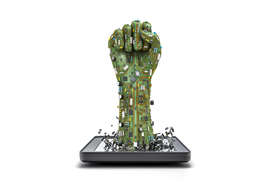
August 27, 2014

Source: Shutterstock
God may have given control of the earth to man, but He didn”t give us the wisdom to know when enough is enough. Capitalism’s constant process of satisfying more consumers has its benefits. Being able to talk with friends and family within a matter of seconds is invaluable. But there’s always a cost to doing business. “Smart” technology has become so embedded in everything, it almost seems impossible to disconnect our lives from cyberspace.
In the war to conquer nature, we may be getting ahead of ourselves by relying so heavily on technology. In his essay “The Joker in the Pack,” the English poet W.H. Auden wrote that “in our culture, we have all accepted the notion that the right to know is absolute and unlimited.” Unlike material goods, we somehow don”t think the pursuit of knowledge is stifled by the same law of diminishing marginal returns. This is highly liberal thinking. But perhaps man is not meant to absorb so much in such a limited period of time. Perhaps, as Auden put it, “the only knowledge which can be true for us is the knowledge we can live up to …”
That sounds blasphemous to the enlightened, postmodern, tech-savvy mind. If you listen to Silicon Valley CEOs, we”re moving inexorably to a point of hyperrationality. Yet, if you look around, all the technology with which we are blessed acts as a feedback loop that documents the most minute details of our day. Facebook is altering our conception of the news. Smartphones constantly track our movements. Our emotions and our everyday lives are being molded to someone else’s gain. How long this process can continue before fundamentally altering the human condition is anyone’s guess. My fear is that once we go full-on digital, there will be no going back. “Destroying geography“ sounds intriguing, but if intimacy and meaning are tied to specific places, technology may abolish them whole. The ability to become lost will disappear. And our sense of mystery and wonder will be the biggest casualty of all.